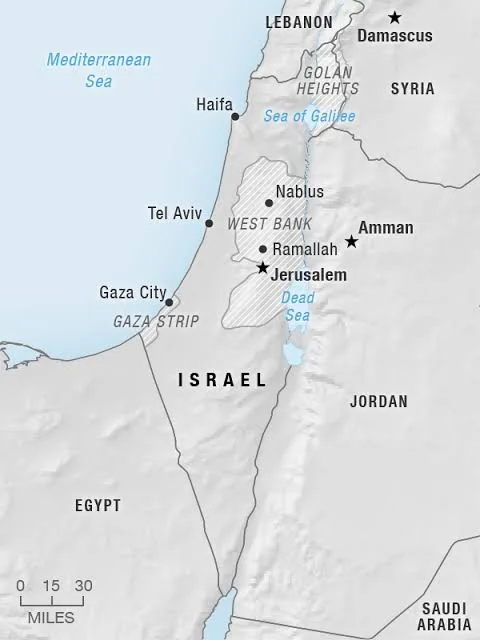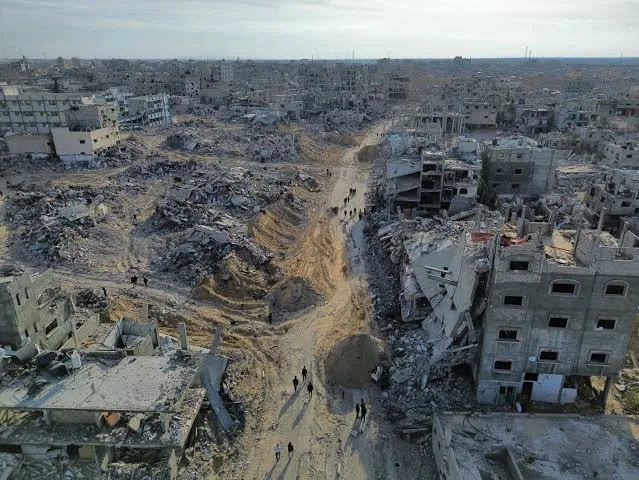By Castle Journal International Desk | July 21, 2025
Gaza/Rafah/Jerusalem – The Israeli military has issued urgent evacuation orders for civilians in central Gaza, as fighting intensifies and ceasefire negotiations falter. The ongoing military offensive has now pushed deeper into the remaining populated zones, forcing tens of thousands of Palestinians into a narrow corridor near the Egyptian border, triggering alarm across regional and international diplomatic circles.
The latest developments mark a dangerous escalation in a war that has already displaced over 1.9 million people and flattened large swathes of the Gaza Strip. With ceasefire talks stalled and no immediate diplomatic breakthrough in sight, humanitarian agencies warn of a looming catastrophe.
Military Push and Evacuation Orders
On Monday, the Israel Defense Forces (IDF) dropped leaflets and sent text messages ordering residents of Deir al-Balah and central Gaza to evacuate southward. The move follows a rapid widening of the military’s operations across the center of the Strip, targeting what Israeli officials describe as “terrorist infrastructure” and “command centers” operated by Hamas and Palestinian Islamic Jihad.
Rear Admiral Daniel Hagari, the IDF’s chief spokesperson, said in a press briefing:
“We are intensifying operations in central Gaza to eliminate remaining terrorist threats. Civilians are urged to leave immediately for their safety. The IDF does not target civilians, but Hamas embeds itself within them.”
Israeli tanks and ground forces reportedly advanced east of Khan Younis and are now operating near the Rafah corridor—an area that borders Egypt and has been the last refuge for hundreds of thousands of displaced civilians.
Egyptian Border Tensions Rise
The expansion of Israel’s military campaign toward Rafah has raised concerns in Cairo, which has consistently opposed any mass displacement of Palestinians toward Egyptian territory.

In an urgent statement, the Egyptian Foreign Ministry warned:
“Any attempt to forcibly push Palestinian civilians toward the Egyptian border is unacceptable and will be met with firm opposition. The sovereignty and national security of Egypt are non-negotiable.”
Satellite images and on-the-ground footage suggest the area near the Rafah crossing is increasingly congested, with makeshift tents and shelters now housing tens of thousands under deteriorating conditions. Aid organizations warn that any further displacement could overwhelm the humanitarian corridor that remains barely functional.
Stalled Ceasefire Talks
Efforts led by Egypt, Qatar, and the United States to broker a ceasefire have shown little progress in recent weeks. Talks have reportedly broken down over two key issues: the timeline for a permanent ceasefire and the terms of prisoner exchanges.
A senior Hamas official speaking anonymously told Castle Journal:
“Israel is demanding the unconditional release of hostages while refusing to commit to a permanent ceasefire. This is not negotiation; this is coercion.”
Meanwhile, Israeli officials maintain that no ceasefire will be agreed upon unless Hamas is disarmed and all Israeli hostages—estimated at 42—are released unconditionally.
US Secretary of State Antony Blinken admitted on Sunday that the “gaps remain significant” but said Washington remains committed to diplomacy.
“A ceasefire is still possible, but it requires concessions from both sides. The humanitarian situation cannot wait.”
Humanitarian Crisis Deepens
According to the United Nations, more than 80% of Gaza’s population is now displaced. Hospitals are operating beyond capacity, food supplies are running low, and the threat of famine is rising.
UN Special Coordinator for the Middle East Peace Process, Tor Wennesland, warned:
“We are witnessing a humanitarian collapse in real-time. The international community must act decisively before it is too late.”
International aid agencies have reported repeated delays and denials in aid delivery, citing ongoing airstrikes and border closures. The WHO and Médecins Sans Frontières (Doctors Without Borders) have appealed for urgent safe zones and uninterrupted access to medical facilities.

Global Reactions
The Arab League has called an emergency session, while the European Union expressed deep concern over Israel’s latest military expansion.
Turkish President Recep Tayyip Erdoğan accused Israel of “ethnic cleansing under the cover of war,” and called for international sanctions. Meanwhile, the UK and Germany have urged restraint but stopped short of criticizing Israel directly.
The UN Security Council is set to convene later this week, though previous resolutions have been repeatedly blocked, especially due to vetoes by permanent members with opposing positions.
Conclusion
As Israel’s military campaign intensifies and diplomatic efforts remain paralyzed, Gaza’s already dire humanitarian situation is deteriorating by the hour. The push toward the Egyptian border threatens to ignite a wider regional crisis, potentially dragging in neighboring states and further destabilizing the fragile balance in the Middle East.
Without immediate international intervention and a renewed commitment to negotiation, the Gaza conflict risks spiraling into a prolonged war with unimaginable human consequences.
© Castle Journal Ltd | www.castle-journal.com
Global News – From the Castle to the World
